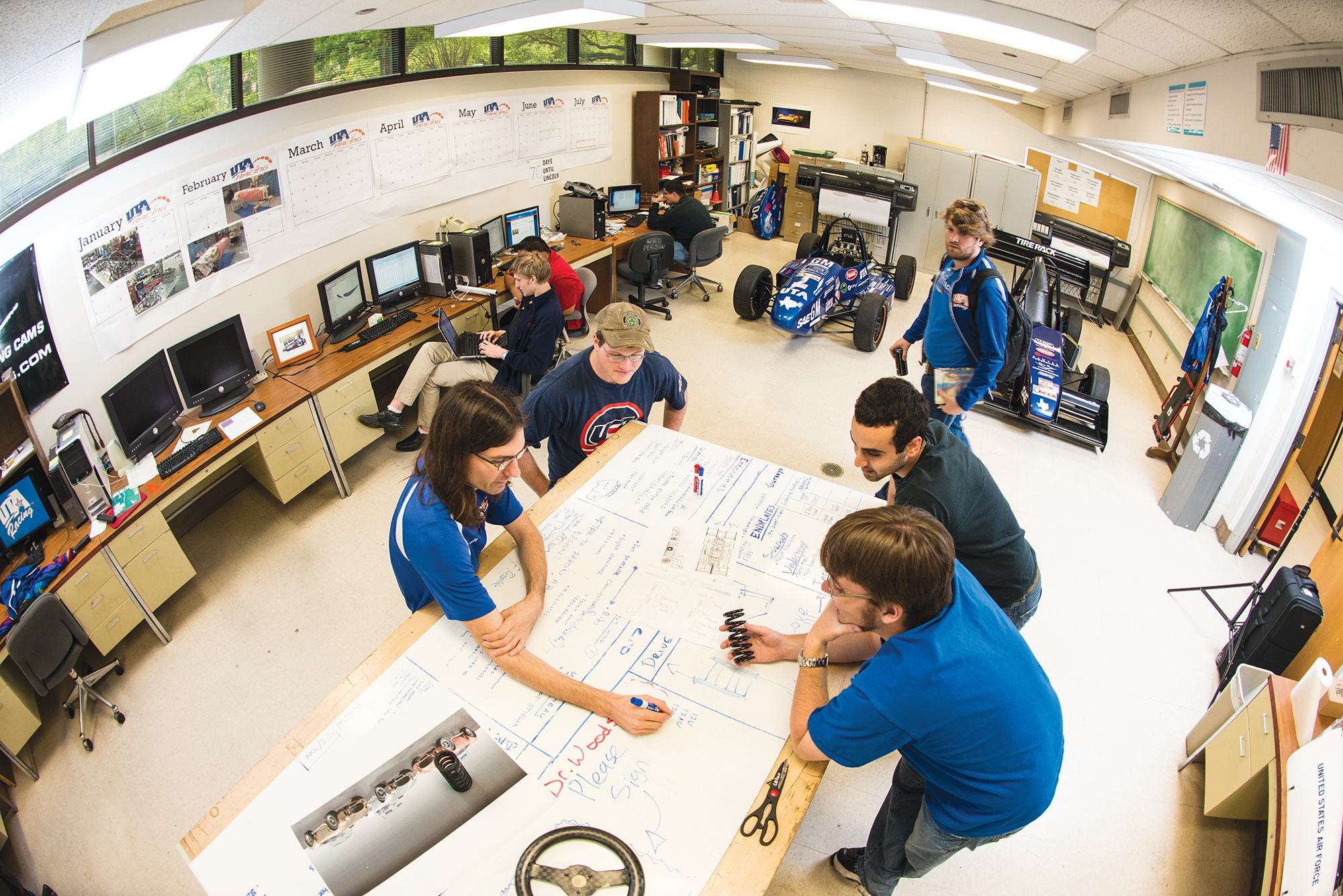8.3 Experiential Learning: Rounding Out Your College Career
What is experiential learning? Very simply, it means learning from your experiences. In this section, you can read about learning from your experiences outside the classroom. You need to ask this question of yourself: How can I have the college experience of a lifetime?
At UT Arlington, you have many opportunities to make your college experience exceptional, unforgettable, and (dare we say?) sensational. Engaging in opportunities outside of the classroom can inform your major and career exploration process and open your eyes to things you have never experienced.
Career Planning Timeline
During your freshman year…
- Meet with an advisor in the University Advising Center to discuss a schedule of classes that will fulfill the university’s core requirements or help you explore majors.
- Take a class on Major Exploration if you are undecided.
- Research the services available from the Lockheed Martin Career Development Center.
- Attend at least two academic seminars put on in the colleges you are interested in.
- Take career assessment inventories online and receive counseling to interpret results that can help you plan your career.
- Visit the Career Center and become familiar with job listings, some of which may relate to your career plans.
- Participate in student organizations to develop your leadership skills.
- Attend the Job Fair.
During your sophomore year…
- Continue working with your advisor or a career specialist in the Career Center regarding how interests and aptitudes relate to potential career choices.
- Obtain information and begin the registration process for relevant work experiences, such as cooperative education opportunities and internships.
- Keep a list of all of your projects, activities, committee memberships, and honors, as well as a portfolio that can be used for a résumé or during an interview.
- Join at least one professional or honorary organization to begin networking.
- Participate in at least two academic and career seminars (i.e., Test Taking, Job Search).
- Attend the Job Fair.
- Apply and become accepted officially into your major department.
During your junior year…
- Attend at least two career seminars (i.e., Résumé Preparation, Interview Skills).
- Register for internship or cooperative education positions with the Career Center or your academic department.
- Develop an effective cover letter and resume that have been critiqued by the Career Center.
- Attend the Job Fair.
- Assume a leadership position on campus.
- Conduct at least two “informational interviews” with professionals in your area of interest. Refer to “How to Conduct an Informational Interview.”
- Become familiar with at least three career options related to your major.
- Become familiar with the Career Center on-campus interview and resume referral processes.
- Make an appointment each semester to discuss progress toward graduation with your academic advisor.
As a senior/graduate student consider the following steps…
- Complete the Graduation Checklist (Office of the Registrar) and apply for graduation and graduate school.
- Attend a Career Center orientation and other career seminars sponsored by the Career Center, and register with the Career Center job listing service if you have not already done so.
- Talk to the Career Center staff to ensure you are utilizing the various job search strategies and resources.
- Conduct three “informational interviews” with professionals in your career field.
- Learn about current salary levels for occupations you are considering.
- Develop a realistic budget analysis and determine your salary needs.
- Check with the Career Center for information about companies interviewing on campus.
- Talk to recent graduates concerning the employment market in your field.
- Learn how to research companies using the Internet and the UTA Central Library.
- Attend the Job Fair.
What’s a Maverick to Do?
Begin thinking now of strategies you can use to make sure you have at least one of these “value added” experiences:
UT Arlington Links to Experiential Learning
| Apply for an internship | UTA Internship Resources |
| Research experience with a member of the faculty | UTA Research Overview |
| Take a study abroad trip | UTA Study Abroad Program |
| Service learning experience | Center for Service Learning |
Internships can provide you with the practical, “real world” experience you need to be competitive in today’s job market. Internships also provide you with a new network of people, individuals outside of the University setting, who can provide mentorship and companionship to you. At a minimum, an internship will allow you to evaluate how well you “fit into” a career culture. For example, you may love information technology (IT) and, through an internship experience, find out that you are also well-suited to the pace and excitement of the IT field.
LMCD Handshake Resources

Research experiences with particular faculty, research groups, and Centers for Excellence are important to consider especially if you plan to further your education beyond your undergraduate degree. Is it too early to begin thinking of advanced degrees? Absolutely not. Most students who are in graduate schools today began their research careers as undergraduates. They acted as “apprentices” to a faculty member and worked with members of the faculty’s team: graduate research assistants, post-doctoral researchers, and collaborating colleagues. Such experiences can also teach you transferable skills like project design and management, goal setting, and communication skills that can be used wherever your career may take you.
Becoming involved in research may seem intimidating, but UT Arlington provides resources to help you engage with professors and research topics you are interested in. The Office of Undergraduate Research (OUR) offers tools to help you identify your research interests and manages several programs that pair you with a faculty member on a research project. You can also get involved with research by talking with your professors; they are often working on a research project you could help with, or they may know a different faculty member who is directing a project more closely aligned with your interests and academic and professional goals. Note that research is not limited to sciences like chemistry and biology – research occurs in every discipline on campus.
Undergraduate Research Opportunities

Be sure to talk to your advisor about taking a readings or research class with a faculty member of your choice. You need to work this experience into your roadmap for success. It is important to contact the faculty member well in advance to be sure that he/she has room in the laboratory or research group for you in a given term.
Study Abroad Opportunities are another way to make your college experience exceptional. Travel broadens you in so many aspects – you can develop new friendships while exploring different cultures of the world and earning college credit. UT Arlington offers hundreds of programs across more than 40 countries; check out the website below to see which programs interest you.
UTA Study Abroad Program

Funding is available from many sources. You can meet with a study abroad staff member from the Office of International Education (OIE) to discuss funding opportunities to lower the cost of your trip. Again, planning ahead is key, so after reviewing your study abroad options, visit with your advisor to be sure you can plan for study abroad in your academic plan.
Have you ever done some volunteer work? Do you want to be of service to others during your college years? Service learning, organized by the Center for Service Learning, provides the ways and means for faculty and students to “learn from doing”—doing community service as part of your coursework, and learning as you go. Course credit is given for service learning activities. When you visit the center online, look at some of the courses offered. Faculty are increasingly adding service learning components to their classes. UT Arlington boasts having 790,516 logged hours of service in recent years.
Center for Service Learning
Service learning is not just for people thinking about careers in public service. These experiences help you integrate what you are learning in the classroom with “real world” problems and needs. You can build your civic and leadership skills through many community activities and share your reflections on these experiences with others. Scholarships are available, too.
So let’s return to the question: How can I have the college experience of a lifetime?
Round out your roadmap with an internship, research participation, a study abroad trip, or service learning—or all of these. Experiential Major Maps (EMMs) suggest ways that you can participate in experiential learning opportunities – find the EMM for your major or a major that you are interested and see how you can apply the information you are learning in class to life outside the classroom. Afterwards, engage in some of these experiences and write about them. Who knows? These experiences may lead to new opportunities in your future.
Experiential Major Maps
Tips for Reflective Journaling
 I never travel without my diary. One should always have something sensational to read in the train.
I never travel without my diary. One should always have something sensational to read in the train.
— Oscar Wilde
Students learn the most from their experiences when they take the time to think about them and write down their thoughts. Articulating your experiences this way also helps you practice articulating them to potential employers.
Consider including some of these items:
- Include key individuals and your exchanges with them.
- When examining your thoughts and feelings, do not censure yourself.
- Use “prompts”—key words, ideas, and pictures to keep the writing going.
- Don’t forget your dreams and imagined scenes.
- Compare your new experiences to the old. How have you changed?
Thought Question
- This is a brainstorming exercise: Pair up and discuss (then share with another pair) the number of different ways that experiential learning “adds value” for us.
- Why are internships increasingly important? In the film The Pursuit of Happyness, the main character took an unpaid internship at great personal cost to himself. Why?
- Have you seen the film Pay It Forward? Would it be possible for this plan to work? How would you initiate this plan on a college campus such as ours?
Activity 8-4:
Interview a member of the Alumni at UT Arlington (and note that many work or attend graduate school here). Explore with them what made his/her experiences exceptional, unforgettable, or sensational. Ask how his/her experiences look in retrospect and find out if experiential learning opportunities would have benefited them in any way and why.
Activity 8-5:
Go online to explore if your favorite writers, historians, or other celebrities used reflective journaling to inspire their work. (For instance, Lewis Carroll of famed Alice’s Adventures in Wonderland is one such person.) You may wish to begin your search with key phrases like “famous diarists” or read short biographies of the persons you selected. Write down the benefits enjoyed by these people who kept journals.

